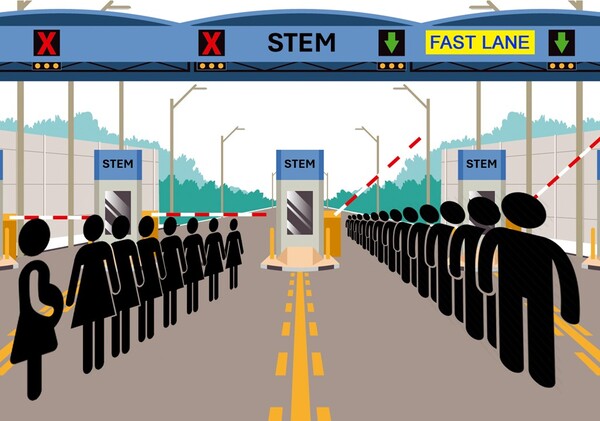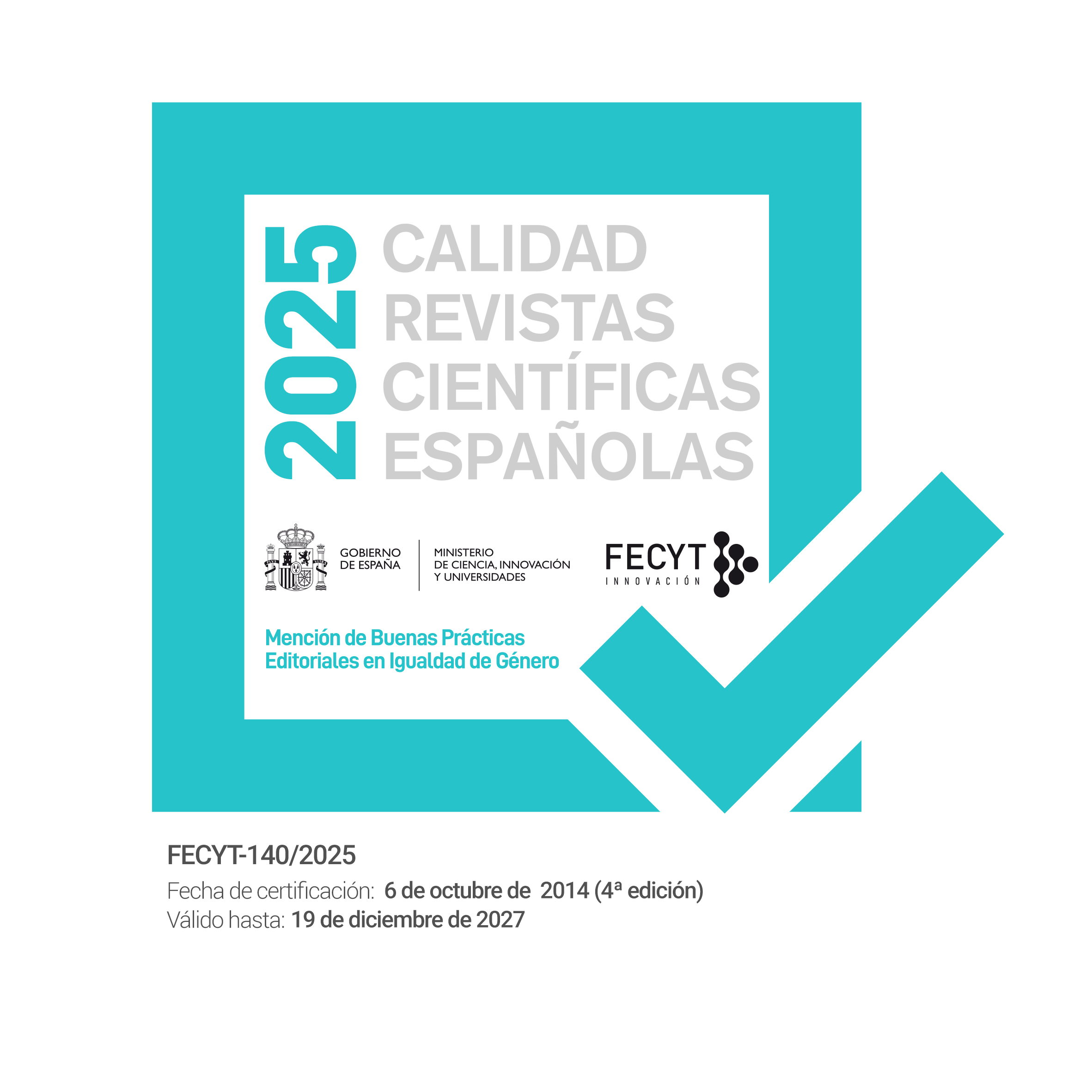Actions for gender equality in scientific-technical areas in Spanish universities
DOI:
https://doi.org/10.5944/educxx1.38279Keywords:
gender equality, gender stereotypes, gender bias, STEM Education, research training, women scientistsAbstract
This article analyses the actions carried out in Spanish universities to achieve gender equality in scientific-technical disciplines, where women are still under-represented and there is a low level of gender mainstreaming that can affect research and innovation. In order to diagnose the situation, a survey was carried out aimed at the equality units that form part of the Network of Gender Equality Units for University Excellence (RUIGEU). The survey consisted of thirteen questions relating to: actions to favour the access and permanence of women in the PECS areas (Physics, Engineering, Computer, Science), the recognition of student work carried out with a gender perspective, the valuation of teaching and research with a gender perspective, the visibility and recognition of female researchers and actions for effective equality. This survey was anonymous and was answered by 28 units. From the answers obtained, we can extract a low level of involvement of the universities in promoting equality in this area. Furthermore, the analysis of archetypes shows that only five of the universities that participated in this study are committed to equality in the scientific-technical field and carry out actions to achieve it. These results show, on the one hand, that it is possible to implement actions to promote equality in the scientific and technical field. On the other hand, the collaboration of other institutions (Ministry of Universities, National Agency for the Evaluation of Accreditation (ANECA) and Conference of Rectors of the Spanish University (Crue)) is necessary to promote equality in all universities.
Downloads
References
Armstrong, J. S., & Overton, T. S. (1977). Estimating nonresponse bias in mail surveys. Journal of Marketing Research, 14(3), 396-402. https://doi.org/10.2307/3150783
Ayuso, N., Fillola, E., Masia, B., Murillo, A. C., Trillo-Lado, R., Baldassarri, S., Cerezo, E., Ruberte, L., Mariscal, D., & Villarroya-Gaudó, M. (2021). Gender gap in STEM: a cross-sectional study of primary school students’ self-perception and test anxiety in mathematics. IEEE Transactions on Education, 64(1), 40-49. http://dx.doi.org/10.1109/TE.2020.3004075
Bernardo Álvarez, A. (2021). Acoso. #MeToo en la ciencia española. Next Door Publishers.
Bian, L., Leslie, S., & Cimpian, A. (2017). Gender stereotypes about intellectual ability emerge early and influence children’s interests. Science, 355(6323), 389-391. https://bit.ly/49spkp7
Cabero, I., & Epifanio, I. (2021). A data science analysis of academic staff workload profiles in Spanish universities: gender gap laid bare. Education Sciences, 11(7), 317. https://doi.org/10.3390/educsci11070317
Cabero I, Epifanio, I., & Gual-Arnau, X. (2023). Analysis of archetypes to determine time use and workload profiles of Spanish university professors. Education Sciences, 13(3), 295. https://doi.org/10.3390/educsci13030295
Calvo-Iglesias, E., Epifanio, I., Estrade, S., & Mas de les Valls, E. (2022). Gender perspective in STEM disciplines in Spain universities. In R. Huang, Kinshuk, M. Jemni, N. -S. Chen, & J. M. Spector (Eds.), Women in STEM in higher education: good practices of attraction, access and retainment in higher education (pp. 165-179). Springer Nature Singapore. https://bit.ly/3PUTudF
Calvo Iglesias, E. (2022a). Perspectiva de género en la docencia universitaria de las materias STEM, una revisión. In L. Molina García, D. Cobos Sanchiz, E. López Meneses, A. Jaén Martínez, & A. H. Martín Padilla (Eds.), Educación y sociedad: pensamiento e innovación para la transformación social (pp. 807-815). Dykinson. https://bit.ly/3vxiLnt
Calvo Iglesias, E. (2022b). Premios a los Trabajos de Fin de Grado con perspectiva de género en las disciplinas CTIM, una revisión. In J. M. Esteve Faubel, A. Fernández Sogorb, R. Martínez Roig, & J. F. Álvarez Herrero (Eds.), Transformando la educación a través del conocimiento (pp. 191-200). Octaedro. https://bit.ly/3U2HE3A
Castaño Collado, C., & Vázquez-Cupeiro, S. (2023). Resistance and counter-resistance to gender equality policies in Spanish universities. Papers. Revista de Sociologia, 108(2), Artículo e3105. https://doi.org/10.5565/rev/papers.3105
Cimpian, J. R., Kim, T. H., & McDermott, Z. T. (2020). Understanding persistent gender gaps in STEM. Science, 368(6497), 1317-1319. https://bit.ly/3vIeWvz
Couso, D. (2023). Investigación educativa con perspectiva de género: ¿de qué estamos hablando? [Vídeo]. YouTube. https://bit.ly/3U4D70x
De la Cal, M.L., Etxezarreta, A., Galbete, A., & Martinez, E. (2023). Estudio brecha salarial de género en las universidades públicas españolas. https://bit.ly/3TtEh4e
Díaz, C. (2021). Cuando las informáticas rompen el techo de cristal. [Webinar]. Tv USC. https://bit.ly/49n4R4Z
Epifanio, I., Ibáñez, M. V., & Simó, A. (2020). Archetypal analysis with missing data: see all samples by looking at a few based on extreme profiles. The American Statistician, 74(2), 169-183. https://doi.org/10.1080/00031305.2018.1545700
Galán, A. (2023). Tiempos convulsos para la ética en la ciencia y en el uso de las métricas. Educación XX1, 26(2), 9-14. https://doi.org/10.5944/educxx1.37562
Gallardo, M. (2021). Does maternity affect women’s careers? Perceptions of working mothers in academia. Educación XX1, 24(1), 405-428. http://dx.doi.org/10.5944/educXX1.26714
García, C. (2023, 7 marzo). La brecha de género persiste en la universidad: el abismo de los honoris causa. elDiario.es. https://bit.ly/3IJf9RY
García-Dauder, S., & Pérez-Sedeño, E. (2017). Las” mentiras” científicas sobre las mujeres. Catarata.
García-Lastra, M. (2022). Coeducación y formación del profesorado: una (nueva) oportunidad para repensar la práctica educativa. In N. Morales (Ed.), Igualdad y coeducación. Retos para las escuelas del siglo XXI (pp. 33-45). Ediciones Universidad de Salamanca. https://doi.org/10.14201/0AQ0336
Generalitat de Catalunya (2023). Protocol guia d’àmbit universitari per prevenir i reparar amb diligència deguda les situacions de violència masclista, assetjament sexual i assetjament per raó de sexe, orientació sexual, identitat de gènere o expressió de gènere. https://bit.ly/49XqiL2
González-Pérez, S., Martínez-Martínez, M., Rey-Paredes, V., & Cifre, E. (2022). I am done with this! Women dropping out of engineering majors. Frontiers in Psychology, 13, Artículo 918439. https://doi.org/10.3389/fpsyg.2022.918439
González Ramos, A. M. (2018). ¿Por qué abandonan las mujeres? En A. M. González Ramos (Ed.) Mujeres en la ciencia contemporánea: la aguja y el camello (pp. 39-66). Icaria.
Heijstra, T. M., Steinthorsdóttir, F. S., & Einarsdóttir, T. (2017). Academic career making and the double-edged role of academic housework. Gender and Education, 29(6), 764-780. https://doi.org/10.1080/09540253.2016.1171825
Izquierdo-Useros, N., Marin Lopez, M. A., Monguió-Tortajada, M., Muñoz-Moreno, J. A., Agusti Benito, C., Morón-López, S., Evans, H., Gualdrón-López, M., Müller, J., & Prado, J. G. (2022). Impact of COVID-19 lockdown in a biomedical research campus: a gender perspective analysis. Frontiers in Psychology, 13, Artículo 906072. https://doi.org/10.3389/fpsyg.2022.906072
Ley Orgánica 2/2023, de 22 de marzo, del Sistema Universitario. Boletín Oficial del Estado núm. 70, de 23 de marzo de 2023. https://bit.ly/4amSmrA
Lombardo, E., Bustelo, M., Alonso, A., Verge, T., Elizondo, A., Tildesley, R., Diz I., & La Barbera, M. C. (2021). Igualdad e interseccionalidad en las universidades. Recomendaciones. https://bit.ly/4cLKUHZ
Martín Carrasquilla, O., Muñoz San Roque, I., & Santaolalla Pascual, E. (2023). Actitudes hacia la ciencia en la educación STEM: desarrollo de una escala para la detección y fomento de vocaciones tempranas. Revista Española de Orientación y Psicopedagogía, 34(1), 122–140. https://doi.org/10.5944/reop.vol.34.num.1.2023.37421
Menachemi, N. (2011). Assessing response bias in a web survey at a university faculty. Evaluation & Research in Education, 24(1), 5-15. https://doi.org/10.1080/09500790.2010.526205
Miralles-Cardona, C., Cardona-Moltó, M. -C., & Chiner, E. (2020). La perspectiva de género en la formación inicial docente: estudio descriptivo de las percepciones del alumnado. Educación XX1, 23(2), 231-257. https://doi.org/10.5944/educxx1.23899
Moss-Racusin, C., Dovidio, J. F., Brescoll, V. L., Graham, M. J., & Handelsman, J. (2012). Science faculty’s subtle gender biases favor male students. PNAS, 109(41), 16474-16479. https://doi.org/10.1073/pnas.1211286109
Nash, M., Grant, R., Moore, R., & Winzenberg, T. (2021). Male allyship in institutional STEMM gender equity initiatives. Plos One, 16(3), Artículo e0248373. https://doi.org/10.1371/journal.pone.0248373
Powell, K. (2021). The parenting penalties faced by scientist mothers. Nature, 595(7868), 611-613. https://doi.org/10.1038/d41586-021-01993-x
Red de Unidades de Igualdad de Género para la Excelencia Universitaria (2022). Las políticas de igualdad universitarias: XV Encuentro RUIGEU 2022: diagnóstico de los grupos de trabajo. https://bit.ly/49rhpZl
Resa, A. (2023). Igualdad de género y formación inicial del profesorado en España: entre la utopía y la realidad. Profesorado, Revista de Currículum y Formación del Profesorado, 27(1), 255–275. https://doi.org/10.30827/profesorado.v27i1.21192
Reverter-Bañón, S. (2021). La igualdad de género en la universidad. Capitalismo académico y rankings globales. Investigaciones Feministas, 12(2), 271-281. https://doi.org/10.5209/infe.72331
Rossi, A. S. (1965). Women in science: why so few? Social and psychological influences restrict women’s choice and pursuit of careers in science. Science, 148(3674), 1196-1202. https://bit.ly/3xgWzyb
Sáinz, M. (2017). ¿Por qué no hay más mujeres STEM? Se buscan ingenieras, físicas y tecnólogas. Ariel y Fundación Telefónica.
Sáinz, M., Fàbregues, S., Rodó-de-Zárate, M., Martínez-Cantos, J. -L., Arroyo, L., & Romano, M. -J. (2020). Gendered motivations to pursue male-dominated STEM careers among Spanish young people: a qualitative study. Journal of Career Development, 47(4), 408–423. https://doi.org/10.1177/0894845318801101
Samper-Gras, T. (2022). A lo importante, ya van ellos. Una propuesta contextual desde los nuevos materialismos para comprender por qué hay tan pocas mujeres en ciencias técnicas. Cuestiones de Género: de la Igualdad y la Diferencia, 17, 209-231. https://doi.org/10.18002/cg.i17.7248
Saura, G., & Caballero, K. (2020). Capitalismo académico digital. Revista Española de Educación Comparada, 37, 192. https://doi.org/10.5944/reec.37.2021.27797
Schiebinger, L., & Klinge, I. (2020). Gendered innovations 2: how inclusive analysis contributes to research and innovation. Publications Office of the European Union.
Segovia Saiz, C., Briones Vozmediano, E., Tomás Mateos, J., González María, E., & Gea Sánchez, M. (2023). El techo de cristal de las mujeres investigadoras en ciencias de la salud en España. Feminismo/s, 42, 385-412. https://doi.org/10.14198/fem.2023.42.14
Sugimoto, C. R., & Larivière, V. (2023). Equity for women in science: dismantling systemic barriers to advancement. Harvard University Press.
Unidad de Mujer y Ciencia (2023). Científicas en Cifras 2023. https://bit.ly/3JdtMx7
Valls, R., Puigvert, L., Melgar, P., & Garcia-Yeste, C. (2016). Breaking the silence at Spanish universities: findings from the first study of violence against women on campuses in Spain. Violence Against Women, 22(13), 1519-1539. https://doi.org/10.1177/1077801215627511
Verdugo-Castro, S. (2022). La brecha de género en los estudios universitarios del sector STEM en el espacio español de educación. [Tesis doctoral, Universidad de Salamanca]. GRIAL Repositorio documental Universidad de Salamanca. https://bit.ly/3AqxPTH
Yang, Y., & D. Wright Carroll. (2018). Gendered microaggressions in Science, Technology, Engineering, and Mathematics. Leadership and Research in Education 4, 28-45. https://bit.ly/3PPixii

Downloads
Published
How to Cite
Issue
Section
License
Copyright (c) 2024 Irene Epifanio, Encina Calvo-Iglesias

This work is licensed under a Creative Commons Attribution-NonCommercial 4.0 International License.
Educación XX1 is published under a Creative Commons Attribution-NonCommercial 4.0 (CC BY-NC 4.0)










